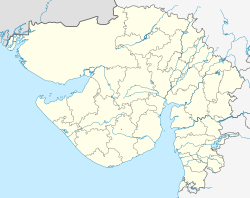Variav
| Variav | |
|---|---|
| Suburb | |
| Location in Gujarat, India | |
| Coordinates: 21°15′39″N 72°49′14″E / 21.26083°N 72.82056°ECoordinates: 21°15′39″N 72°49′14″E / 21.26083°N 72.82056°E | |
| Country |
|
| State | Gujarat |
| District | Surat |
| Languages | |
| • Official | Gujarati, Hindi |
| Time zone | IST (UTC+5:30) |
| PIN | 394520 |
| Nearest city | surat |
Variav is a small village situated in Surat District, Gujarat, India. Variav is on the right bank of Tapti River. Variav was recently added to the region of Surat Municipal Corporation, and is now a suburb of Greater Surat.
Variav is an ancient town of some historical importance. As early as the seventh century CE it may have been known as a place of migration of Zoroastrians fleeing the fall of the Sassanid Empire. The arrival of Zoroastrians in India is documented in Qissa-i Sanjan, and the date of first arrival is variously interpreted as being 936 AD, 765 AD and 716 AD. Others have noted a gradual period of immigration between the 10th and 12th centuries
The Parsis landed as refugees in Sanjan but they worked very hard and prospered as agriculturists and artisans. Gujarati had become the native language of the community, and the sari was now the traditional garment of Parsi women. While they adapted to the land, they still kept their religion and customs alive. By the end of the 10th century the Parsis began to settle all over Gujarat and spread to Bharuch, Variav, Cambay, Navsari and Ankleswar. Variav is a settlement near Surat on the Tapti river, and the story of the heroism of the Parsi women of Variav is sung in Garbas (Gujarati folk songs) till this day.
The Parsis had prospered through their hard work and the rich earth of Gujarat yielded fruitful returns. They grew different types of flowers and all types of grains and cereals. Their prosperity made the Raja of Ratanpur jealous. Towards the end of the 11th century he demanded a huge tribute from the Parsis. The Paris refused to pay and the king sent troops to enforce his law. The Parsis, who were law abiding, now gathered together to resist this unjust tax. The king’s troops had to retreat in defeat.
The king got even angrier and began plotting the downfall of the settlement. He came to know through his spies that the men of the community were going to be away at a ghambar (seasonal festival and feast) in the village of Tena near Surat. All adult men would be busy attending the festivities and the land would be easy to capture and destroy.
As the troops gathered outside the village, the brave village women of Variav decided that they could not give up their homes and fields without a fight. One of the women had a plan. She quickly gathered all the women and persuaded them to put on the clothes and armour of their men folk. They hid their long hair under the metal helmets of the men. When the king’s troops attacked Variav they were surprised to find a large army of men facing them across the fields. The battle was long and fierce, the women had just started chasing the Ratanpur troops out of their land when a sudden blow to a woman’s helmet dislodged it and the helmet fell to the ground.
...
Wikipedia

